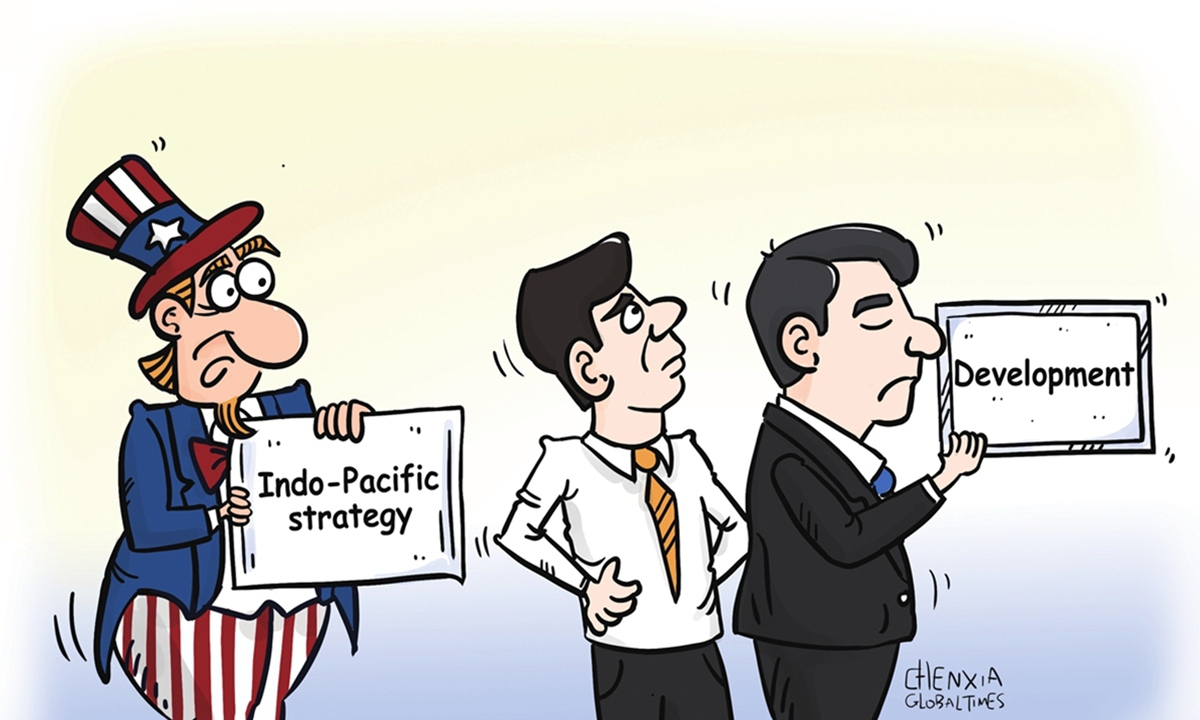
Illustration: Chen Xia/GT
Washington's missile defense proposal has sparked debate in Palau, Reuters reported on Wednesday. The US has begun work on an over-the-horizon radar system in the Western Pacific country, whose president in September asked Washington for a permanent deployment of the Patriot missile defense system. However, in late November, the Senate of Palau passed a resolution opposing the deployment, which, according to Australia's ABC, "catches observers by surprise."
Palau, located between the Philippines and Guam, is one of the three Micronesian nations that have signed a Compact of Free Association (COFA) with the US. Under the treaty, Washington provides economic support to the three countries in exchange for military access to their territories.
For many years, the US military has used Palau's islands for various military exercises, such as the Valiant Shield 2022, in which the US military conducted a Patriot missile live-fire exercise for the first time in Palau.
Yang Honglian, a Fiji-based senior researcher at the Pacific Islands Research Center of Liaocheng University, told the Global Times that due to its geopolitical position, Palau is strategically an important ally for the US to maintain its presence in the Pacific region. The US may be considering turning Pacific island countries like Palau into back-ups if Washington is forced to retreat from its first island chain during wartime, he added.
According to Chinese military expert Song Zhongping, the deployment of Patriots in Palau aims to protect the safety of the over-the-horizon radar system there, an important part of the US' global anti-ballistic missile system against possible threats from China and Russia.
As some voices in Palau oppose the idea of US missile defense deployment, the Reuters report claimed such opposition has led to suggestions of Chinese interference. However, according to experts, it is untenable to think that China would interfere in Palau's internal affairs, especially considering the absence of diplomatic relations between the two countries and US' dominant presence in the Pacific island country.
In fact, people who assume that local opposition in Palau is, partially or not, the result of Chinese interference completely ignore the Palauan people's demands for development and peace.
As a bloody battleground during World War II, Palau is rightful to become concerned about the result of deploying a US missile defense system: it doesn't want to become the frontline for great power disputes or even war. Therefore, the Palauan Senate's opposition is in line with its desire to preserve the country's national interests, sovereignty and independence.
In addition, currently, issues such as climate change and economic development are the primary concerns of Pacific island countries. These nations seek pragmatic cooperation with countries, including China, to address those pressing challenges based on common interests. "China threat" is having less and less market in the Pacific island countries in the face of the pursuit of economic development and international assistance.
Besides, Washington's credibility is tottering in the region. The Joe Biden administration is seeking more than $7 billion over the next two decades for economic assistance to the three COFA countries; yet, the new deals are still waiting for the approval of the US Congress.
The opposition to missile deployment in Palau should sound an alarm to the US that regards the three COFA countries as pivots of its Indo-Pacific strategy in the Southern Hemisphere and military springboards into the South China Sea. To put it more bluntly, these countries are merely chess pieces in Washington's efforts to maintain its global hegemony. The US is not interested in mutually beneficial cooperation with the COFA countries, but rather wants its own security to override theirs.
Chen Hong, a professor of Australian Studies at the East China Normal University in Shanghai, believes that, in fact, leaders and people of most Pacific islands are becoming increasingly aware of Washington's true intention, because none of them are actually willing to be manipulated by the US. "I believe that there will be more and more situations where these countries will dare to say 'no' to Washington to exercise more autonomy."




